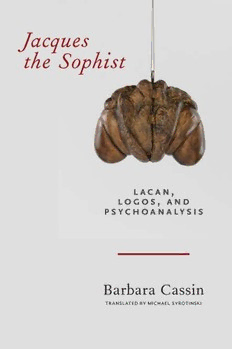
Jacques the sophist: Lacan, logos, and psychoanalysis PDF
Preview Jacques the sophist: Lacan, logos, and psychoanalysis
Jacques the Sophist Jacques the Sophist Lacan, Logos, and Psychoanalysis Barbara Cassin Translated and with notes by Michael Syrotinski fordham university press New York 2020 Copyright © 2020 Fordham University Press All rights reserved. No part of this publication may be reproduced, stored in a retrieval system, or transmitted in any form or by any means—electronic, mechanical, photocopy, recording, or any other—except for brief quotations in printed reviews, without the prior permission of the publisher. This book was first published in French as Jacques le Sophiste: Lacan, logos et psychanalyse, by Barbara Cassin © EPEL, 2012. Published by arrangement with Agence littéraire Astier- Pécher. All rights reserved. Cet ouvrage a bénéficié du soutien des Programmes d’aide à la publication de l’Institut Français. This work, published as part of a program of aid for publication, received support from the Institut Français. Ouvrage publié avec le concours du Ministère français chargé de la Culture–Centre National du Livre. This work has been published with the assistance of the French Ministry of Culture–National Center for the Book. Fordham University Press has no responsibility for the persistence or accuracy of URLs for external or third-p arty Internet websites referred to in this publication and does not guarantee that any content on such websites is, or will remain, accurate or appropriate. Fordham University Press also publishes its books in a variety of electronic formats. Some content that appears in print may not be available in electronic books. Visit us online at www.fordhampress.com. Library of Congress Cataloging- in- Publication Data available online at https://catalog.loc.gov. Printed in the United States of America 22 21 20 5 4 3 2 1 First edition contents Prologue: “How Kind of You to Recognize Me” 1 1. Doxography and Psychoanalysis, or Relegating Truth to the Lowly Status It Deserves 5 2. The Presence of the Sophist in Our Time 23 3. Logos- Pharmakon 39 4. Sense and Nonsense, or Lacan’s Anti- Aristotelianism 59 5. The Jouissance of Language, or Lacan’s Ab- Aristotelianism 93 Epilogue: The Drowning of a Fish 127 Acknowledgments 133 Translator’s Note: Performing Untranslatability 135 Notes 141 Index 171 v I don’t know how to approach, why not say it, the truth— No more than woman. I have said that the one and the other are the same thing, at least to man. — Jacques Lacan, Encore Thirty- six buttocks make eighteen asses. — Jeanne Bréchon, a.k.a. Tomère prologue “How Kind of You to Recognize Me” — Hello, is this Lacan? — Certainly not. Do you remember what Lacan said about agalma in the “Proposition of the 9 October 1967”? “As in all these particular cases that make up the miracle of the Greeks, this one presents us with only a closed Pandora’s box. Open, it is psycho- analysis, which Alcibiades had no need of.”1 As a prologue of sorts, I would like to present a closed Pandora’s box, ancient Greece as it finds its way to the philologist philosophers, those limping centaurs à la Nietzsche. This Greece, or rather its texts, and above all its pre-S ocratic texts, including the texts of the sophists, finds its way to us in fragments via what is called “doxography,” and it will be up to the reader to open it, even if locks are missing even more than keys. This question of the relationship between the transmission of antiquity, via its schools and texts, and the transmission of psychoanalysis was once asked of me by a now departed Argentinian friend, Ezequiel de Olaso, who was very close to Borges. I answered him first of all with an anecdote— all doxography, as we will see, works by anecdote. I narrated the circumstances by which Lacan— it must have been around 1975— asked me to talk to him about doxography. 1
